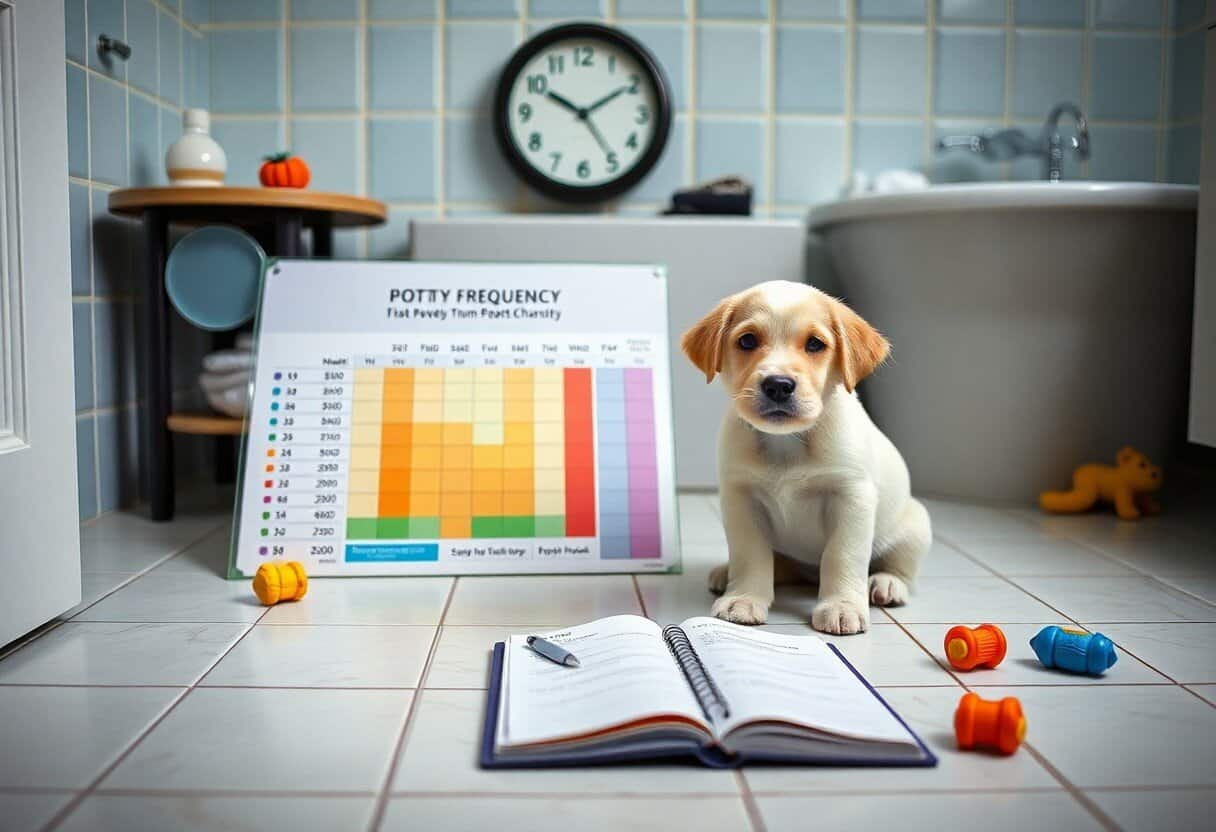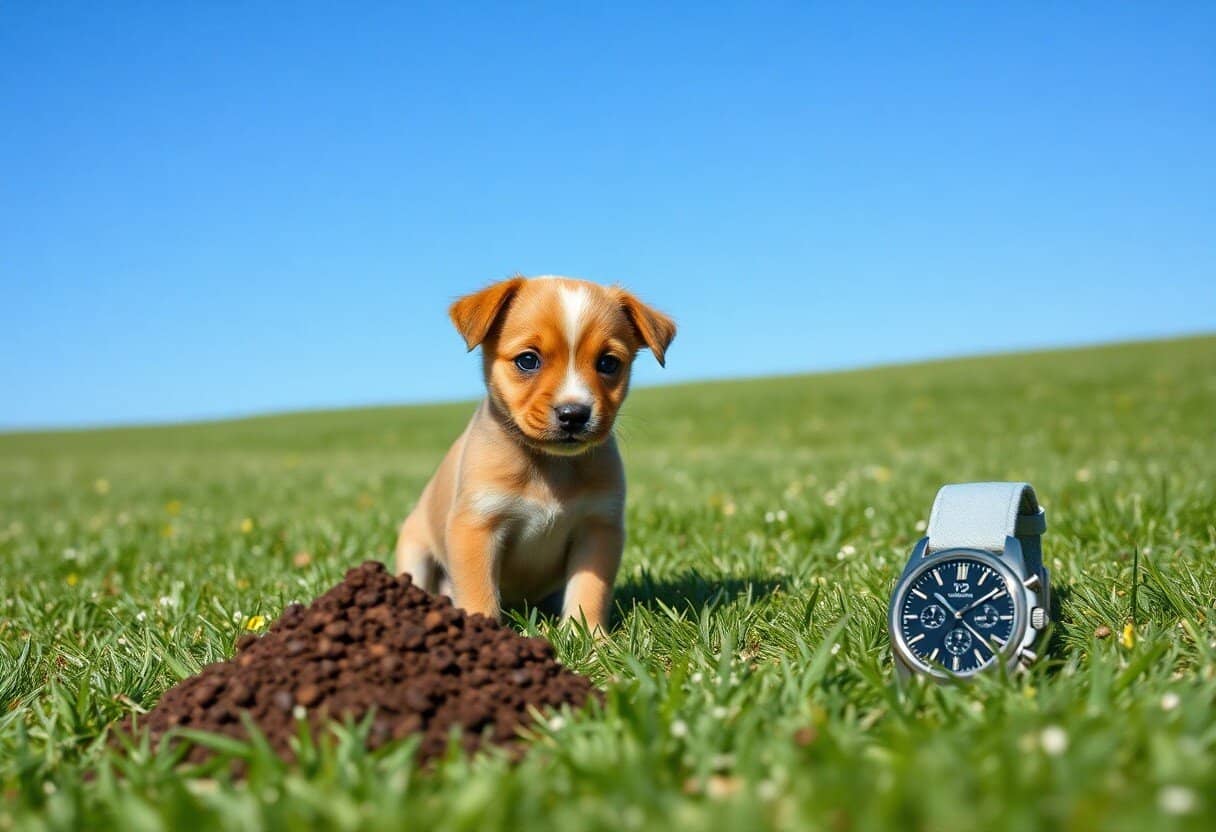How often do puppies poop? Your puppy’s body operates on a natural schedule that influences their potty habits. Typically, puppies will need to relieve themselves shortly after eating, drinking, or waking from a nap. For instance, a meal can trigger a bathroom break within 15 to 30 minutes. As you observe your puppy, you may notice patterns emerging, such as specific times of day when they consistently need to go out.
Key Takeaways:
- Young puppies typically need to go outside every 1 to 2 hours, especially after eating, drinking, or waking up.
- Age and size influence pottying frequency; smaller breeds may require more frequent trips outside than larger ones.
- Establishing a consistent potty routine helps puppies learn when and where to go, leading to successful house training.

How Often Do Puppies Poop
Understanding how often your puppy should be pottying can help you create a consistent routine and identify potential issues. Typically, younger puppies will need to relieve themselves more often—generally every 1 to 2 hours. Factors such as breed, age, and diet all play a role in determining the frequency, as well as their individual habits and comfort levels. By closely observing your puppy’s patterns and responding promptly, you can help them develop good habits.
What’s Normal for Different Breeds
Puppies come in all shapes and sizes, and their pottying frequency can vary significantly by breed. Smaller breeds, like Chihuahuas, may need to go out more often due to their faster metabolism, usually around five to six times a day. In contrast, larger breeds, such as Great Danes, might potty four times a day, but it’s vital to note each puppy is unique.
Influence of Age on Potty Habits
Age greatly affects how often your puppy will need to go outside. As they grow, their bladder capacity expands and they develop better control over their elimination habits. Young puppies, particularly those under six months old, often require more frequent potty breaks due to their immature bladder control.
Puppies around the age of 8-12 weeks typically need bathroom breaks every 1-2 hours. As they reach 4-6 months, you may notice a decrease in frequency, with most puppies able to hold it for longer stretches, possibly up to 4 hours. By the time they reach adulthood at around 1 year, many dogs can comfortably go for 6-8 hours, provided they’ve established a solid routine and their health is good. Always pay attention to your dog’s behavior for signs that they need to go, as individual differences will inform their specific potty patterns.
Dog Pooping Schedule
Several factors can influence how often your puppy needs to potty. Understanding these elements helps you anticipate your puppy’s needs and creates a smoother potty training experience. Look closely at the following:
- Age and breed of your puppy
- Exercise and playtime levels
- Dietary choices
- Hydration levels
Knowing these factors allows you to better understand your puppy’s unique potty schedule.
Dietary Choices
Your puppy’s food directly impacts how often they need to go outside. High-quality, nutrient-dense food may lead to more consistent bathroom habits, while low-quality or high-fiber diets might cause diarrhea or irregular pooping schedules. Pay attention to the ingredients; certain additives can alter digestion and require more frequent potty breaks. Opting for a regular feeding schedule also helps regulate your puppy’s bowel movements.
Hydration and Potty Timing
Hydration plays a key role in your puppy’s potty frequency, as the more water they consume, the more they’ll need to relieve themselves. Puppies typically drink water after meals, during play, and throughout the day. If they are dehydrated, they may not potty as frequently, but this can lead to other health concerns.
A well-hydrated puppy pees approximately every 2 to 3 hours during the day. Young pups may need to go out more often, especially after drinking. Keeping an eye on their water intake and ensuring they have access throughout the day will give you a clearer picture of their bladder control and routine. Knowing when your puppy is drinking can help you predict when the next potty break should happen.
Changes in Patterns
Noticing changes in your puppy’s potty schedule can indicate underlying issues. If your puppy suddenly begins to urinate or defecate significantly more or less often than usual, it may signal a health concern. Diarrhea, excessive straining, or blood in the stool are all warning signs that prompt a consultation with your veterinarian. Keeping an eye on these patterns allows you to intervene early, ensuring your puppy stays healthy and happy.
Signs of Digestive Issues
Watch for symptoms like vomiting, lethargy, or a change in appetite, as these may indicate digestive problems. If your puppy’s stool becomes inconsistent, like watery diarrhea or hard pellets, a visit to the vet is advisable. Being able to describe these signs will aid your vet in providing the best treatment options.
Behavioral Signals
Changes in your puppy’s behavior can also indicate potential health issues. If they start to hide, become unusually aggressive, or seek attention excessively, it could signal discomfort or pain. Sudden changes like refusing to play or act out of character can guide you toward a visit to the vet.
For instance, if your puppy typically enjoys playing with their toys but suddenly becomes withdrawn, it’s time to pay close attention. This behavioral shift may reflect physical discomfort or even emotional stress related to digestive troubles. Additionally, excessive whining or pacing can suggest they might be experiencing discomfort. Keeping a log of these behaviors alongside any potty pattern changes can provide invaluable information for your vet, helping to diagnose the issue more accurately. Regular check-ins with your observation will contribute greatly to your puppy’s ongoing health and wellbeing.

Training Tips
Achieving potty success with your puppy requires dedication and strategy. To enhance your training efforts, consider these tried-and-true tips:
- Establish a consistent potty schedule.
- Observe your puppy’s cues and behaviors.
- Use designated potty spots outdoors.
- Be patient and give your puppy time to acclimate.
- Stay engaged and encourage frequent potty breaks.
Knowing these strategies will allow you to effectively guide your puppy toward successful potty habits.
Establishing a Routine
Creating a reliable potty routine offers your puppy structure and predictability. Ensure you take your puppy out first thing in the morning, after meals, and before bedtime. Aim for potty breaks every one to two hours, particularly during the crucial early weeks of training. Consistency helps your puppy learn when and where to go, making the entire process smoother for both of you.
Positive Reinforcement
Rewarding good behavior boosts your puppy’s confidence and reinforces the desired actions. Whenever your puppy successfully goes potty outside, offer praise, treats, or playtime as a reward. Aim to use high-value treats that your puppy loves to make the experience even more enticing.
Using positive reinforcement techniques creates a positive association with pottying outside, leading to fewer accidents indoors over time. Your puppy will be eager to please you, making it more likely they will remember to go to their designated potty spot. This approach transforms potty training into a fun, interactive process, strengthening your bond with your furry friend along the way.
Long-Term Landscape
As your puppy matures, their potty habits naturally evolve, reflecting their transition into adult dog behaviors. You can expect a gradual decrease in frequency, shifting from those chaotic early potty days to a more predictable routine as they reach around 6 to 12 months of age. By this stage, your dog’s bladder is stronger, allowing for longer intervals between potty breaks without accidents. This transformation is not only a relief but also a crucial aspect of adjusting to life with an adult dog.
Transitioning to Adult Dog
Adult dogs typically require fewer potty breaks than puppies, averaging three to five times a day depending on size, age, and health. As you notice this shift, it’s helpful to establish a regular schedule that aligns with your dog’s new needs. Regular feeding times, consistent walks, and scheduled potty breaks will ease this transition, creating a sense of predictability for both you and your dog.
Maintaining Healthy Habits
Keeping your dog’s potty habits healthy as they mature involves understanding their ongoing needs. While adult dogs have adjusted potty schedules, it’s crucial to maintain regular vet check-ups, monitor diet, and adjust water intake based on activity levels. Changes in behavior or unusual potty patterns can hint at health issues, necessitating swift action to ensure continued well-being.
To maintain healthy habits, introduce a balanced diet that suits your adult dog’s nutritional requirements. Monitor for any changes in appetite or digestion that might affect their bathroom habits. Regular exercise remains vital as it directly influences your dog’s digestion and urinary health, helping to prevent constipation or urinary tract issues. Engaging with your dog daily will not only strengthen your bond but also support their physical health and regular potty routines.
Summing up
Upon reflecting, it’s clear that understanding your puppy’s potty habits can help you create a more comfortable routine for both of you. Puppies typically need to relieve themselves every 1-2 hours, especially after meals, playtime, and naps. By being attentive to your puppy’s needs and adjusting your schedule accordingly, you can support their growth and prevent accidents indoors. Enjoy this journey of learning together as you nurture your furry companion!
FAQ
Q: How often should I expect my puppy to potty?
A: The frequency at which a puppy needs to relieve themselves can vary depending on their age, size, and diet. Generally, young puppies may need to go outside every 1-2 hours, as their bladders are small and they haven’t yet developed control.
Q: Are there signs that indicate my puppy needs to potty?
A: Yes, puppies often display specific behaviors when they need to go outside. These may include sniffing around, circling, whining, or heading towards the door.
Q: What factors can influence my puppy’s potty schedule?
A: Several factors can impact how often your puppy needs to potty. Age is a primary factor, as younger puppies tend to go more frequently due to their developing bladders. Additionally, diet can play a role; certain foods and treats may lead to increased bowel movements.

